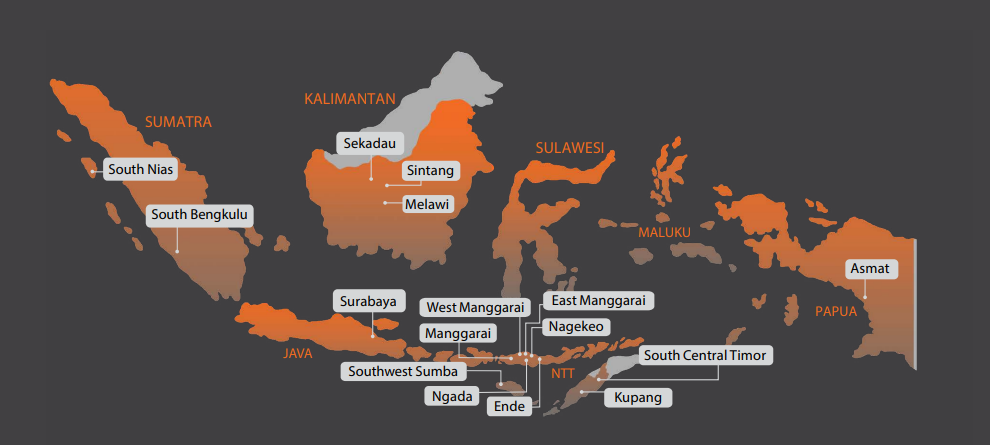Health and Nutrition Program
Stunting, or being too short for one’s age, is a height above two standard deviations below the World Health Organization (WHO) Child Growth Standards median. Inadequate nutrition is one of the many causes of stunting. Factors that contribute to stunted growth and development include poor maternal health and nutrition, insufficient infant and young child feeding practices, and infection. Indonesia is faced with persistent health problems, including nutritional status problems (stunted, wasted, underweight, overweight). Although the stunting rate seems to be decreasing from year to year - in 2018 (Riskesdas/ Basic Health Research) by 30.8%, in 2019 (SSGBI/ Study of Nutritional Status of Children U5 in Indonesia) by 27.7%, and in 2021 (SSGI/ Study of Nutritional Status of Indonesia) by 24.4% - but in WVI ministry areas, figures are still relatively high (average above 30%). Thus, nutrition-related interventions are still very much needed.
What We Have Done in Stunting Prevention?
To focus on decreasing the number of stunting in Indonesia, WV Indonesia has implemented specific intervention or nutrition - focused approach projects in the following sectors:
Infant and Young Child Feeding/ IYCF and IYCF in Emergency/ IYCF-E
IYCF and IYCF-E emphasize the importance of children getting age-appropriate intake by considering the portion, texture, composition of the 4-star food, and other things, including cleanliness in the preparation process. This is attempted in everyday situations or disaster situations.
Positive Deviance/Hearth or PD/Hearth
PD/Hearth is a community-based model that has been scientifically proven internationally to be able to rehabilitate underweight children in their own homes. It targets mildly malnourished, moderately malnourished, and severely malnourished children between the ages of 6 and 36 months
Nutrition in Emergency (NiE)
The nutritional status of children is the most affected thing when a disaster occurs; the healthy approach during a disaster helps the recovery process of the nutritional status, provides better nutritional status data, and builds the confidence of mothers/caregivers to continue to provide the best nutritional intake for children.
Kitchen garden with support or integration with nutrition-sensitive agriculture program and or food security program
Kitchen gardens and other related approaches seek to provide quality food, including its processing, to improve/maintain children’s nutritional status.
Growth Monitoring and Promotion
Growth Monitoring and Promotion (GMP) comprises measurement (the regular recording of a child’s weight and sometimes their height), assessment (plotting weight against age or weight against size on a growth chart, and analysis (interpreting the growth pattern of the child).
Achievements
- 29,531 children monitored for growth at Posyandu (2019-2022)
- 32,477 children under five reached through health & nutrition programs (2018-2022)
- 32,057 people gained access to sanitation facilities in households (2019-2022)
- 25,948 people gain access to safe drinking water (2019-2022)
- 14,470 families have access to clean water sources (2019-2022)
- 1,474 families with nutritional gardens and small livestock (2021-2022)
What Next in Our Stunting Prevention?
To reduce stunting, Wahana Visi Indonesia continues to support the Ministry of Health of Indonesia by supporting the implementation of one of the outcomes of the RPJMN on health, namely “accelerating the improvement of community nutrition” through the integration of specific and sensitive sectors to reduce the number of cases of malnutrition in WVI ministry areas, by the following actions:
- Improve the identification, measurement, and understanding of malnutrition and scale up coverage nutrition focused on stunting prevention.
- Enact policies and/or strengthen interventions to improve maternal nutrition and health.
- Implement interventions for improved exclusive breastfeeding, complementary feeding practices, and underweight children to Hearth sessions.
- Strengthen community-based health and nutrition interventions, including improved water, sanitation, and hygiene as a sensitive intervention of stunting reduction, to protect children from diarrheal diseases, intestinal worms, and environmental causes of subclinical infection.
Contact Person:
Yohana Benu (Head of Grant & Contract Acquisition Management)
Email: [email protected]

